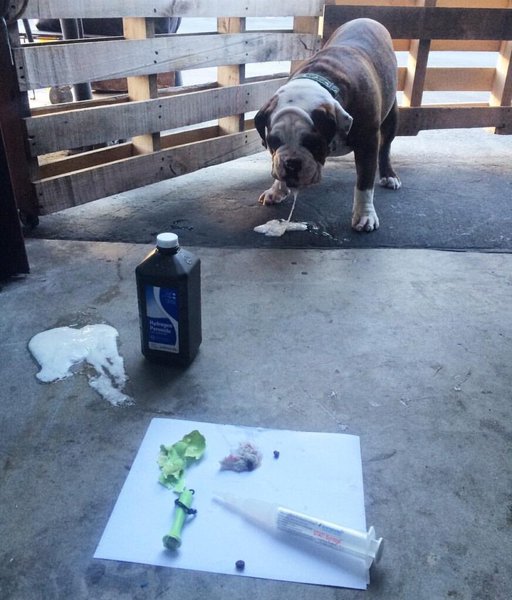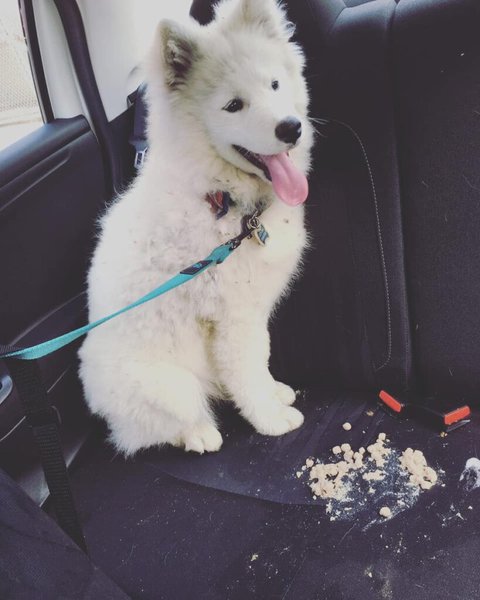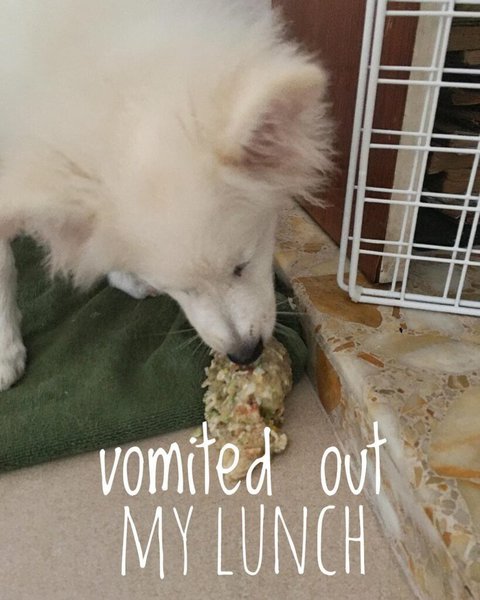It can be quite worrying when your puppy is constantly throwing up around the house. And a greater source of concern for dog owners is when they don’t know the cause of their puppy’s vomiting or the appropriate course of action.
Now, what are the common causes of puppy vomiting? Possible causes of puppy vomiting include gastrointestinal disorder resulting from the ingestion of bad food, overeating or swallowing foreign, indigestible objects. In addition, vomiting by a puppy can be medical, and it can be a sign that the pooch is suffering from a serious condition such as bloat, intestinal parasites, and liver or kidney failure, among others.
That said, the appropriate treatment for vomiting in puppies depends on what is responsible for the pooch throwing up in the first place. Regardless, pending a proper medical diagnosis, there are ways you can bring relief to a vomiting puppy, and these are covered extensively in this article. However, before we go further, let’s determine whether or not vomiting is a common occurrence among puppies.
Is It Common For Puppies To Vomit?
Vomiting is very common among puppies and this is due to reasons such as stomach upsets from poor feeding habits and eating bad or inedible food.
Motion sickness while traveling can also cause a puppy to vomit, and a puppy will also throw up when it is poisoned or teething. Medical reasons such as intestinal parasites and bloat can also cause a puppy to vomit.
Poor Feeding Habits
Because puppies are yet to learn appropriate feeding techniques, it is quite possible for a young pooch to eat too much, too fast. And the end result of this absurd eating practice is the food upsetting the puppy’s stomach, which in turn, causes the pooch to throw up.
In the same vein, puppies that exercise right after eating, are likely to suffer a stomach upset and vomit the food they’ve just eaten.
Eating Bad Food And Inedible Objects
Puppies that are fond of foraging through garbage for food will most likely end up picking spoilt food or inedible objects that won’t digest properly, thereby causing the pooch to vomit as a result.
In addition, feeding your puppy with scraps for your plate is not the best thing for your pooch; By doing this, not only will you be teaching your puppy gluttony, but there’s also a chance that you’ll end up giving the pooch human food that’ll trigger gastrointestinal upset and cause vomiting.
Motion Sickness
Not all puppies are used to traveling in a vehicle, and the stress of going on car rides can make a puppy sick and cause the pooch to vomit.
Motion sickness is made even worse if you feed the puppy just before embarking on the road trip, as the pooch has a whole lot more substance to throw up.
Poisoning
Common household products such as detergent, cleaning products, car oil and some house plants contain toxins that are harmful to puppies. And when ingested in any amount, these substances will induce vomiting, as well as a myriad of other symptoms in the pooch.
Teething
It is possible for teething to cause an upset stomach in the affected puppy, and this in turn, leads to the pooch vomiting.
However, you should note that vomiting induced by the teething process in puppies typically doesn’t last long. And if your 9-week-old puppy continues vomiting for an extended period, you should contact a vet immediately.
Intestinal Parasites
The presence of intestinal parasites such as roundworms and tapeworms typically induces vomiting in a puppy. Vomiting in this case is usually accompanied by diarrhea, and in this case, you can visibly observe the parasites in the pooch’s stool.
Food Intolerance And Allergies
Different dogs are allergic to different food substances. And if, all of a sudden, your puppy begins vomiting after eating, then it may have been a food substance that you’ve fed the pooch, causing an allergic reaction, or that it’s stomach is unable to tolerate.
Bloat
Bloat, which occurs when a puppy’s stomach rapidly fills with gas, liquid or food, is a serious medical issue requiring urgent medical attention.
And one of the signs that a puppy is suffering from a bloated stomach is when the pooch makes repeated attempts to vomit with little or no substance coming out of the dog’s mouth.
Additional Causes Of Puppy Vomiting
Other factors and medical conditions that may trigger vomiting in puppies include:
- Sudden change in diet
- Heatstroke
- Use of certain medication
- Liver or kidney failure
- Constipation

How Can I Make My Puppy Feel Better After Vomiting?
You can make your puppy feel better after vomiting by keeping the pooch warm and comfortable, not scolding the puppy, cleaning up the soiled fur and gently massaging the pooch.
Keeping The Puppy Warm
If you notice your puppy shivering after vomiting, you should provide warm blankets to keep the pooch warm, while also encouraging it to lie down and rest.
Do Not Scold The Puppy
It is important that you avoid scolding your puppy after it must have vomited, as you’ll only be passing across a wrong message to the pooch. Instead of scolding the puppy, you should speak normally to the pooch and reassure it that it has done nothing wrong.
Cleaning Up Soiled Fur
Leaving a puppy drenched in its own soil can make the pooch really uncomfortable, and also lead to its fur getting matted; Hence, you should try to clean up the fur when the puppy has rested enough.
Massage
You can also make your puppy feel better after vomiting by gently massaging the pooch’s stomach. You should, however, take care not to press on the puppy’s stomach too hard, as this may only cause the pooch to throw up some more.

What Can You Give A Puppy For Vomiting?
Besides making them happy, there are several home remedies and over-the-counter medications you can give a puppy to relieve its upset stomach and stop the vomiting.
Home Remedies To Relieve Vomiting Puppies
Some of the common domestic substances with which you can relieve your puppy’s upset stomach and stop its vomiting include:
Electrolytes
Sport drinks such as Gatorade that contain a significant amount of electrolytes are effective at replenishing fluid lost by a puppy while vomiting, and subsequently restoring the puppy’s body to its natural state.
Puppies may find it difficult to hold down sport drinks; Hence, it may be helpful to freeze whatever sport drink you’re giving your puppy and encourage the pooch to lick the ice cubes.
Ginger
By feeding your puppy pet-safe treats or tea with ginger as a major ingredient, you can effectively combat and stop nausea and vomiting by the pooch.
You can also feed ginger to your puppy in raw or powdered form, but this has to be done carefully and strictly by following an appropriate dosage only.
Slippery Elm Bark
Slippery Elm Bark contains tannins that serve as anti-inflammatory agents that help puppies with gastrointestinal issues such as an upset stomach, diarrhea, and by extension, vomiting.
Slippery Elm is typically available in capsule, tablet or powder form, but you should consult your vet to prescribe an appropriate dosage for your puppy.
Over-The-Counter Medication For Treating Vomiting In Puppies
OTC medication and products that are commonly used to treat vomiting in puppies include:
Pepto-Bismol
Pepto-Bismol, also known as Pink Bismuth, has been proven to be effective at easing upset stomachs in puppies, and subsequently stopping vomiting.
Pepto-Bismol is readily available at medicine stores. But you should consult with your vet before administering this drug on your puppy to avoid issues with allergic reactions to components of the drug, which is commonly observed among pooches.
Probiotics
Probiotics, like Purina Fortiflora, work to soothe a puppy’s upset stomach. And when taken regularly, probiotics also improve a puppy’s gut health.
However, probiotics shouldn’t be used without a vet’s recommendation, and any product you’ll purchase should be supplied by a reputable veterinary manufacturing company.
NOTE! None of the remedies listed above are intended to substitute for professional medical attention. And you should always consult your vet if your puppy continues vomiting after administering medication or if you notice the manifestation of additional symptoms.

Should I Feed My Puppy After Vomiting?
It is recommended that you avoid feeding your puppy for, at most, 12 hours after vomiting.
Feeding your puppy immediately after it has vomited will most likely irritate the pooch’s stomach lining, and this will only result in even more vomiting.
By not feeding your puppy immediately after it has vomited, you’re giving room for the doggie’s stomach to settle. And at the same time, you can also find out if the puppy throwing up was food-related.
In addition, by withholding your puppy’s meals, you’re giving the pooch a chance to get rid of substances that might be responsible for the gastrointestinal disorder.
It is important to note that not all puppies can go hours without eating though. And if you have a pooch that is suffering from an underlying medical condition, you should consult with your vet before withholding its meal for that sort of duration.
What Do You Feed A Puppy That Is Vomiting?
When eventually it is time to feed a puppy that has been vomiting, it is recommended that you begin by gradually reintroducing minimal amounts of food that is low in fat and easy to digest – in other words, bland dog food.
Typical bland foods that you can feed to vomiting puppies include skinless chicken, boiled potatoes, vegetables such as and cooked white rice which provide energy needed to sustain the pooch.
When preparing bland meals for vomiting puppies, you should ensure that the meals are thoroughly cooked and unseasoned, thereby making it easier for the puppy to digest.
Returning To The Normal Diet
If, after feeding your puppy with bland food for, at least, three days, you notice that the pooch’s vomiting has subsided, you should introduce a switch back to the normal dog diet.
It is advisable that you initiate this diet switch for a previously vomiting dog by mixing bland dog food into the pooch’s regular diet. As the days pass by, and your puppy becomes more stable, you should gradually reduce the amount of bland food ingredients till your pooch completely returns to its normal diet.
Keep The Puppy Hydrated
Because your puppy is constantly letting out fluids while vomiting, you should try as much as possible to keep the pooch hydrated.
You don’t necessarily have to give your puppy water, and it is advisable that you try a number of healthy fluids till you find one that your pooch is comfortable with drinking.
Also, before giving the puppy water or any other appropriate fluid, you should clean the pooch’s mouth with a wet washcloth to get rid of vomit remnants.
In addition, giving the puppy too much water immediately after vomiting may cause the pooch to throw up again, while failure to give the puppy enough water will most likely result in dehydration.
Hence, it is important to find a balance regarding the amount of water that’s sufficient for your vomiting puppy, and maintain this as much as possible.
The general recommendation is to give the puppy one teaspoon of water per pound of body weight, at intervals of one hour.

When Should I Take My Puppy To The Vet For Vomiting?
It is advisable that you take your puppy to the vet for vomiting if you notice the manifestation of other medical symptoms. In the same vein, your puppy may require urgent medical attention if it fails to stop vomiting, even after being placed on a bland food diet.
As stated earlier, vomiting in puppies can be a sign that the pooch is suffering from a serious health condition. And in this case, urgent medical attention is needed to preserve the dog’s life.
To be certain that your puppy’s vomiting requires your vet’s attention, there are other noticeable symptoms you may observe in your pooch along with the vomiting. These symptoms typically vary depending on the nature of the puppy’s ailment, but some of the more commonly observed ones include:
- Abnormally high body temperature
- Presence of blood in the vomitus
- Vomiting even when the puppy isn’t being fed anything
- Extreme lethargy and dehydration
- Seizures
- Breathing difficulties, and any other symptom that looks out of place
By taking your puppy to the vet upon noticing these symptoms, the vet can run the necessary sets of tests and medical examinations to find out what exactly is wrong with the pooch. And it is the result of these tests that will aid the vet to determine the next course of action.






